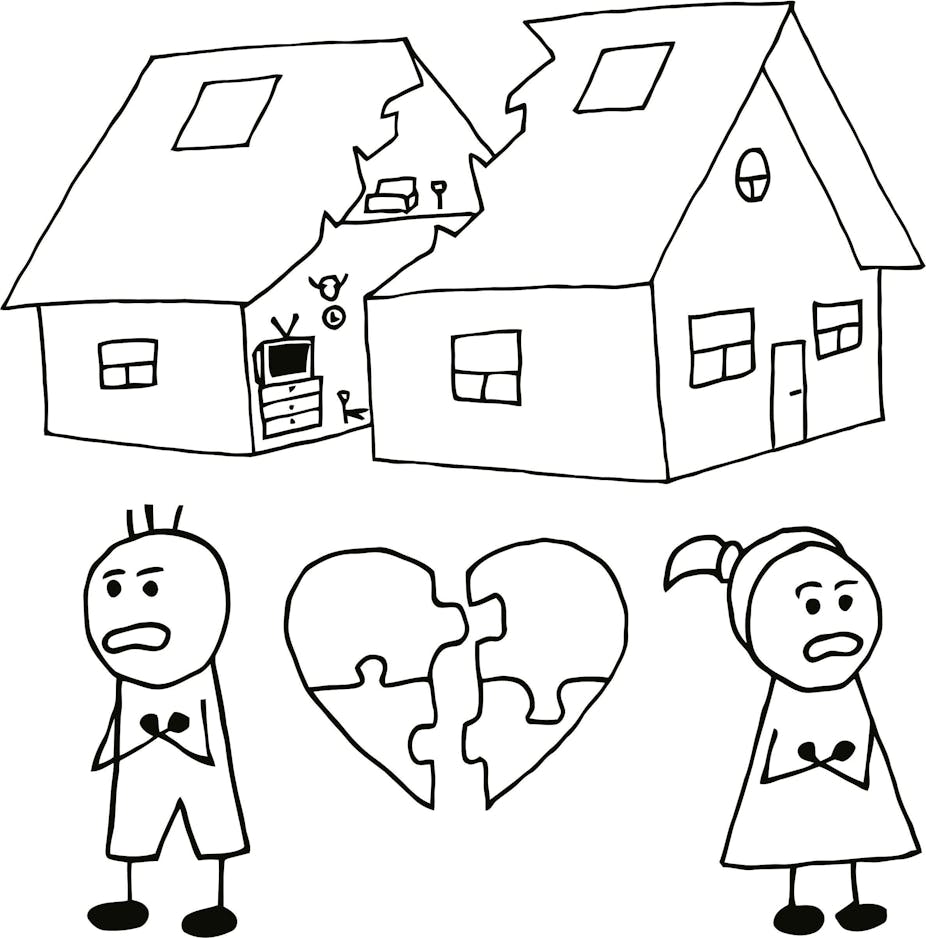Australia is going through a well-documented housing affordability crisis. Single parents are especially vulnerable to rising housing costs, as they rely on a single income to provide a decent home for the family. Past research has found that:
In 2013-14, 46% of … low-income couple families and 67% of one-parent families with dependent children in private rental housing paid more than 30% of their income on rent.
These families are facing “housing affordability stress”. Taken together, rising housing costs and diminishing family benefits are putting low-income Australian families, and especially those that break down, at risk of intense financial stress, housing insecurity and possibly homelessness.
In my recent research with Jan van Ours, we used a unique dataset of disadvantaged Australians, Journeys Home, and showed that parental separation increases the risk of becoming homeless.
Finding the relevant data
In our study, we used a broad characterisation of homelessness, which seeks to identify situations in which families’ housing conditions do not meet standard requirements to qualify as a “home”.
This is qualitatively similar to the Australian Bureau of Statistics’ definition. Homelessness includes:
sleeping rough or squatting in abandoned buildings;
staying with relatives or friends temporarily with no alternative; or
staying in a caravan park, boarding house, hotel or crisis accommodation.
Parental separation can lead to homelessness in many ways. For example, a separation might require an urgent move, which generates a financial shock. Without enough savings or networks of family and friends to help cover this unexpected expense, low-income parents may be unable to afford secure and safe housing for their family and hence become homeless.
Financial pressure on single-parent households increased again in April when legislation that froze or reduced entitlements to several family benefits was passed.
Even less-disadvantaged parents, who may be able to cope financially in the short run (by covering housing costs with their savings, for example), may be unable to do so in the medium run (once those savings run out). They then become homeless a few years after the separation.
Parental separations can also create conflict between parents and children. This may drive children out of their parent’s home and potentially into homelessness in subsequent years.
What did our research show?
In the Journeys Home sample, family breakdown appears to be an important trigger for homelessness. Of those who have experienced homelessness, 62% of respondents cite family breakdown or conflict as the main reason for becoming homeless for the first time.
However, the research linking parental separation and homelessness is scarce. This is because most of the available datasets are not well suited to this purpose.
Disadvantaged populations – that is, people who have experienced homelessness – are underrepresented in general household surveys. And datasets that include only people who are currently homeless fail to capture other segments of the disadvantaged population who might be at risk of homelessness.
In contrast, Journeys Home is unique in that it covers a broad spectrum of the disadvantaged population, not just those currently homeless. In fact, 75% of respondents were not homeless at the time of the first interview.
At the same time, the high frequency of homelessness and parental separation in the sample provides enough occurrences to help us answer the question of a potential causal relationship between the two.
We exploited Journeys Home’s detailed information on respondents’ histories to investigate whether their parents’ separation (if ever) led to their first experience of homelessness (if ever).

We found that parental separation increases the overall likelihood of becoming homelessness, although the risk for any individual is influenced by the particular characteristics of both the family and the individual. The effect is substantial.
For boys, their risk of becoming homeless by age 30 increases by ten to 15 percentage points. This is irrespective of their age when the separation occurs.
For girls, only parental separation before the age of 12 matters. This increases their likelihood of being homeless before 30 by 15-20 percentage points.
The effects of separation on homelessness are larger when the parents were formally married.
These results constitute a critical first step in understanding how individuals, and in particular children or young adults, become homeless. They highlight the role of parental separation in the process and hence the need to act on the issue of housing affordability for disadvantaged families that break down in order to protect children from poverty and homelessness.

